2020 NCCETC Projects and Programs – A Noteworthy Year!
The North Carolina Clean Technology Center (NCCETC) had big plans for 2020 and the novel Coronavirus was not going to stop us. Center staff worked tirelessly to continue advancing clean energy technologies and partner with other companies and organizations to drive these advancements forward.
Below is a synopsis of highlights from 2020 at NCCETC. Thank you for a great year!
This year NCCETC continued its involvement with the two-year project “Planning an Affordable, Resilient, and Sustainable Grid in North Carolina.” Last year, North Carolina received a $300,000 competitive award from the U.S. Department of Energy (DOE) for a joint project by the N.C. Department of Environmental Quality (DEQ), UNC Charlotte’s Energy Production Infrastructure Center (EPIC), and NCCETC. The two-year project, “Planning an Affordable, Resilient, and Sustainable Grid in North Carolina,” will include opportunities for interested stakeholders to review the metrics developed by the research team and to provide input into an advanced grid scenario focused on enabling a more decentralized resilient grid, including micro/mini grids that can support critical services, such as hospitals, in the case of power outages.
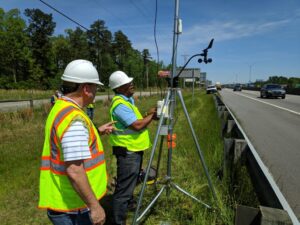
In January, the Clean Fuel Advanced Technology (CFAT) Project released its third round of grants. The 2020 CFAT initiative offered $1.4 million focused on reducing transportation-related emissions, supported with federal Congestion Mitigation Air Quality funding from the N.C. Department of Transportation (NCDOT). NCDOT also provided funding
to the NCCETC for a study of wind energy generation potential along North Carolina highways. The intent of the study was to determine the potential for highway traffic to generate wind energy to support small highway electrical loads such as roadside lighting, signage and emergency signals.
Later that month, the Database of State Incentives for Renewables & Efficiency (DSIRE), operated by NCCETC, and EnergySage partnered to enable homeowners to find, research and receive quotes on solar installations all on the DSIRE website. Also in 2020, DSIRE announced the launch of two new research offerings through DSIRE Insight, related to the Public Utility Regulatory Policies Act (PURPA) and investor-owned utility avoided cost rates. [this was the second new offering] PURPA has been a key policy for renewable energy development in the , requiring utilities to purchase electricity from small renewable or cogeneration facilities at the utility’s avoided cost of electricity.
In February, NCCETC partnered with online education provider ed2go to offer 12 new online training courses covering topics such as wind energy, HVAC/R, home inspections, indoor air quality, indoor environmentalist prep, LEED, welding and an HVAC course offered in Spanish.
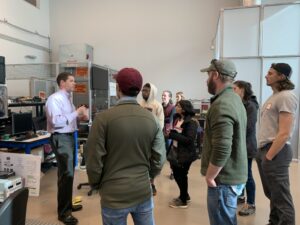
NCCETC also kicked off the Energy That Works (ETW) series with a field trip including NC State students from several different majors and backgrounds to FREEDM Systems Center on Centennial Campus. Students learned about FREEDM’s goals to modernize the electric grid and encourage the use of sustainable energy in the United States.
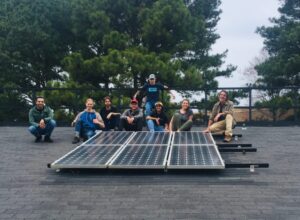
Then, in March, eight students spent their spring break learning how to install a solar photovoltaic system on a mock roof as part of ETW. After completing the course, students earned certificates of completion and became eligible to take NABCEP PV Associate Exam.
At the U.S. Army Corps of Engineers’ fifth Resource Efficiency Manager Workshop in April, team members of NCCETC’s Clean Power & Industrial Efficiency provided guidance and training to help Army Resource Efficiency Managers enhance their installation energy programs. NCCETC also joined Cliburn and Associates Team in the U.S. Department of Energy’s Solar Energy Innovation Program Project that month, a program that supports multi-stakeholder teams pursuing new applications of solar energy and other distributed energy resources
NCCETC introduced its Energy and Sustainability Services in May – a suite of services from the Center aimed at optimizing sustainability and energy-related objectives for business, industry, government and utilities. Later that month, NCCETC lended its clean energy expertise in transportation, policy and power to help contribute to an Energy Storage, Electric Vehicles and EV Charging Study for the Fayetteville Public Works Commission. The study gathered information about energy storage applications and services, electric vehicle options and trends, including electric vehicle charging and fleet opportunities.
The national LKQ Corporation cut the ribbon on a brand new propane fueling system, announcing the expansion of 19 new propane-powered trucks in its delivery vehicle fleet at one of the company’s locations in Garner, N.C. The new system was funded by NCCETC’s CFAT project and will help improve air quality in North Carolina and save the company on fueling costs.
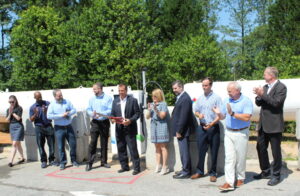
Also in June, the NCCETC concluded its four-year long Community Solar for the Southeast Project. The Center first received a grant award from the Solar Energy Technologies Office of the DOE in 2016. The project was created to provide resources and to support the development of community solar programs at electric cooperatives and municipal utilities across the southeastern United States.
In July, the U.S Department of Energy released their Draft Energy Storage Grand Challenge Roadmap, outlining how the United States. will conduct R&D and deploy energy storage technology to address grid challenges. NCCETC joined the Solar Plus for Electric Co-ops project led by Jill Cliburn of Cliburn and Associates to help electric cooperatives design, purchase and operate battery storage by examining solar and storage through the lens of procurement.
North Carolina’s Offshore Wind Industry Supply Chain and Infrastructure Assessment kicked off in August. The study will address the role that wind technology manufacturing can play in N.C.’s workforce and overall economy as offshore wind plays an increasing piece in the state’s energy mix by 2030 and beyond. A few months later, in December, the N.C. Department of Commerce and NCCETC opened the North Carolina Offshore Wind Supply Chain Registry which allows companies in North Carolina and beyond to publicly indicate their interest and ability to supply components and services to offshore wind projects.

Also in August, NCCETC partnered with the DOE and SunSpec Alliance for a program titled Cyberguardians to prepare military veteran job seekers for cybersecurity positions working with distributed energy resource (DER) technologies. Though interconnecting devices through DERs increase responsiveness, efficiency, performance and energy management but can also increase cyberattack risks. So, NCCETC signed onto a three-year program to offer training for veterans and motivated students on cybersecurity.
In September, East Carolina University reached out to NCCETC to partner for the U.S. Environmental Protection Agency’s 2020-2022 grant period. This project entitled “Greening Industries in North Carolina: Making Pollution Prevention Pay” will continue to provide pollution prevention technical assistance to North Carolina’s industrial companies. NCCETC will work with eight different companies to identify energy efficiency improvements, capital costs, simple payback and the reduction of CO2 per year. Also in September, NC State University was named among 10 “Energy Elite” colleges and universities by the American Energy Society in their Top Energy Universities 2020.
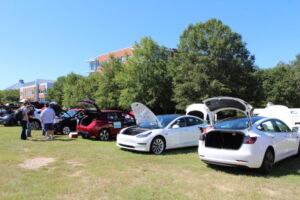
National Drive Electric Week was recognized for the ninth consecutive year since 2011 in October. This year, NCCETC held a Sustainable Fleet Conference entitled “Electrification of Transportation and Climate Change Impact” where Governor Cooper discussed North Carolina’s focus and electrification and reduction of transportation emissions.
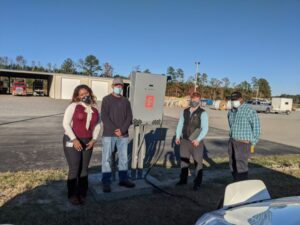
At the end of the year, NCCETC joined the Roanoke Electric Cooperative to pilot cutting edge vehicle-to-grid technology. The Cooperative is working with Fermata Energy to pilot the first electric vehicle charging system equipment to meet the North American standard for two-way current as verified by Underwriters Laboratories.
The 50 States of Solar, Grid Modernization and Electric Vehicles reports were all released quarterly in 2020. These products are all included in DSIRE Insight and are available for purchase. An Executive Summary is available for free.
Due to the pandemic, the 2020 State Energy Conference was postponed. We look forward to inviting everyone to the 2021 State Energy Conferenceto connect technical innovation, diverse resources and industry opportunity to help drive North Carolina’s regional energy economy forward. Stay tuned for more information!
These are a few of the project and program highlights that made 2020 a noteworthy year at NCCETC! The Center staff is looking forward to more exciting partnerships in 2021.